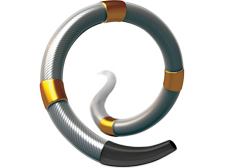
Symplicity Spyral Multi-electrode Renal Denervation Catheter (Image courtesy of Medtronic)
The medtech giant isn’t giving up yet on renal denervation, if a new announcement is any indication.
Chris Newmarker
Medtronic is engaging in a new study to investigate the effectiveness of renal denervation in reducing uncontrolled hypertension.
The new Spyral HTN Global Clinical Trial Program, announced Wednesday, comes more than a year after Medtronic’s previous Symplicity HTN-3 study raised questions about the efficacy of the treatment.
Spyral will start out with two global studies meant to address the confounding factors encountered during Symplicity, including medication, patient population and procedural variability. The study’s approach is actually similar to an antihypertensive pharmaceutical clinical trial, and was recommended by both the FDA and the global clinical community, according to Medtronic.
"Medtronic believes the underlying science behind renal denervation is strong and that there is a clear unmet need for people with uncontrolled hypertension. Therefore, we remain committed to exploring the clinical potential of renal denervation in this population," Jason Weidman, vice president and general manager of Medtronic Coronary and Renal Denervation, said in a news release.
"To get to this point, we've performed extensive analyses and conducted additional pre-clinical testing following the Symplicity HTN-3 trial. We've also consulted with the FDA and reimbursement bodies, and partnered with renowned thought-leaders worldwide to develop this novel clinical trial protocol,” Weidman said.
Renal denervation involves applying radiofrequency ablation through a catheter to the renal artery that supplies the kidneys with blood. The minimally invasive procedure is supposed to lower blood pressure by cutting off nerve signals to the artery.
Proponents have seen it as a treatment solution for people whose high blood pressure is resistant to prescription drugs. But then the Symplicity results came along in January 2014.
The Symplicity HTN-3 study, which involved a randomized 535 treatment-resistant hypertension patients in 87 U.S. medical centers, demonstrated that the treatment was safe. But it did not meet its goals for lowering blood pressure among those who received the treatment, versus the control group that underwent a sham procedure. Those in the control group had the option to receive the treatment after the six month assessment was over.
The Symplicity results caused some U.S. and European physicians to recommend that the use of the technology be curbed or cut altogether. And the number of companies active in the renal denervation space dwindled.
Even though Medtronic retreated a bit with its program, official there were still insisting a year ago that they weren’t giving up on renal denervation, though.
In the new Spyral program, physicians are using Medtronic's next-generation renal denervation technology, composed of the highly flexible 6 Fr compatible, multi-electrode Symplicity Spyral catheter and Symplicity G3 radiofrequency generator. Both the catheter and generator are investigational in the United States and Japan.





